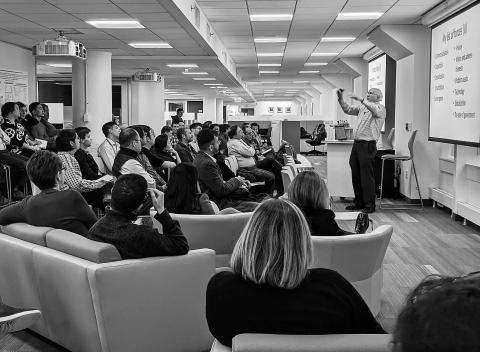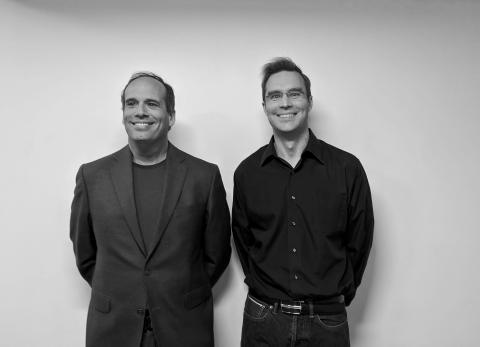Upcoming Events
Past Events
Landmark Ideas Series
April 29, 2021 at 5:00PM - 6:30PM
In an age where technology appears to rule supreme, it is easy to forget that our relationship with technology is complicated. Just as humans shape technology, it shapes us in return. It is also easy to only see things through the lens of the technologies we have to hand, and build solutions that ill fit reality. Electronic health records for example demand that clinical work bends to the needs of documentation, with the end result being burnt out clinicians who do anything but what they were taught at medical school. Algorithms built with our cleverest machine learning methods just end up making concrete the biases implicit in their data sets. Seeing human systems like healthcare as sociotechnical systems helps us understand these unintended consequences, and gives us a different lens to understand technology design and use.
BCH AI & Machine Learning Working Group
April 13, 2021 at 2:00PM - 3:00PM
Dr. Beam led a discussion on the following article: Tom B Brown, Benjamin Mann, Nick Ryder, et al. Language models are few-shot learners. arXiv preprint arXiv:2005.14165 [cs], 2020. Dr. Beam also discussed results from his group that evaluates this model on medical applications.
BCH AI & Machine Learning Working Group
March 16, 2021 at 2:00PM - 3:00PM
Dr. Ben Reis will lead a discussion on the recent New England Journal of Medicine paper he co-authored, providing the first real-world study of effectiveness of the Pfizer-BioNTech COVID-19 vaccine. It was the largest study yet to quantify the impact of the vaccine outside the confines of a clinical trial. The study used innovative epidemiological methods to analyze vaccine effectiveness for preventing symptomatic diseases, severe illness and death. Dr. Reis will discuss his study and the lessons learned from the nation-wide mass vaccination experience in Israel. The study has been featured in The New York Times, Bloomberg, and Fortune.
Landmark Ideas Series
March 1, 2021 at 4:00PM - 5:30PM
Privacy has become a central focus of policy debates in every context. In this talk, Lessig argues that we’re conceiving of the problem in a fundamentally flawed way. Offered is a different framework, radically different but critically better. Or so it is hoped.
BCH AI & Machine Learning Working Group
February 23, 2021 at 2:00PM - 3:00PM
James will lead a discussion on approaches to addressing racial equity concerns with clinical algorithms, including for arthritis severity (Pierson et al. 2021) and kidney function estimates (Diao et al. 2021):
Landmark Ideas Series
February 22, 2021 at 4:00PM - 5:30PM
There is an urgent need to take what we have learned in our new data-driven era of medicine, and use it to create a new system of precision medicine, delivering the best, safest, cost-effective preventative or therapeutic intervention at the right time, for the right patients. Dr. Butte's lab at the University of California, San Francisco builds and applies tools that convert trillions of points of molecular, clinical, and epidemiological data -- measured by researchers and clinicians over the past decade and now commonly termed “big data” -- into diagnostics, therapeutics, and new insights into disease. Dr. Butte, a computer scientist and pediatrician, will highlight his center’s recent work on integrating electronic health records data across the entire University of California, and how analytics on this “real world data” can lead to new evidence for drug efficacy, new savings from better medication choices, and new methods to teach intelligence – real and artificial – to more precisely practice medicine.
BCH AI & Machine Learning Working Group
January 29, 2021 at 09:30AM - 10:30AM
We are often wowed by the *potential* of AI (and frankly other sophisticated computational approaches) to transform research and clinical workflows. New approaches seem to magically hold unbounded promise. Yet, there is often a large gulf between theory and practice, between a shiny new technique and having anyone just use it. The questions of "How do I get this ? How do I get my data from PACS to connect to this? How do I go from DICOM to something that the neural network wants? How do I get results that are useful?" In this talk I will provide some insights into practically developing, using, and disseminating "AI" (and other) workflows in the BCH clinical and research environment.
Landmark Ideas Series
January 11, 2021 at 4:00PM - 5:30PM
Genome sequencing is revolutionizing the diagnosis of rare diseases, but 95% of these conditions still lack effective therapy. With up to 7,000 distinct genetic diseases to tackle, new and creative frameworks will be necessary to meet this need. Recent advances offer the prospect of platform-based therapeutic approaches to certain genetically targetable disorders — in the right circumstances, facilitating the design and deployment of hyper-personalized drugs for conditions affecting as few as even a single patient. The scientific, clinical, ethical, and regulatory implications of these capabilities will be discussed.
BCH AI & Machine Learning Working Group
December 8, 2020 at 4:45PM - 5:30PM
Dr. Savova led a discussion of tasks and applications of clinical Natural Language Processing (NLP) in medicine, such as: The landscape of neural approaches and clinical NLP (Wu et al, 2019; https://pubmed.ncbi.nlm.nih.gov/31794016/) Data challenges in clinical NLP (de-identified data, usability and challenges) Some tasks and applications Information extraction for cancer surveillance (DeepPhe-CR) (Savova et al, 2017; https://pubmed.ncbi.nlm.nih.gov/29092954/) Treatment information extraction (Bitterman et al, 2020 https://www.aclweb.org/anthology/2020.clinicalnlp-1.21.pdf; Lin et al, 2020 https://www.aclweb.org/anthology/2020.louhi-1.12.pdf) What is trending.
BCH AI & Machine Learning Working Group
November 10, 2020 at 4:45PM - 5:30PM
Dr. Rasooly led a discussion of the following paper about Google/DeepMind's AI system for breast cancer screening: McKinney et al. International evaluation of an AI system for breast cancer screening. Nature2020. as well as the following paper AI transparency/reproducibility: Haibe-Kains et al. Transparency and reproducibility in artificial intelligence. Nature 2020. The two papers are accessible as pdfs here.



